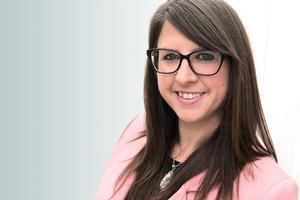Recent MBA graduate Emma Garnick has never hesitated to pursue her passions. When she graduated in 2010 from the University of Cincinnati with an undergraduate degree in women’s gender and sexuality studies, she immediately began providing direct services to non-profits in the Cincinnati area. Her work with AmeriCorps and as a case manager for people living with schizophrenia helped her realize that there was even more that she could do to better the lives of others.
“I decided to return to school to pursue an advanced degree that would provide me with tools to initiate systemic changes aimed at improving the lives of the vulnerable populations I was helping,” she said. “American University had been my dream school for the last decade. Since Washington, DC is where decisions of national importance are made, I have always considered it an important hub of power and the place to make the greatest impact.”
Garnick travelled to DC with $300 in her pocket and settled into her new home—her friend’s futon. “I found two jobs within my first week, and within four months, I had settled into my very own first solo apartment. All of the pieces fell into place,” Garnick said. She was well on her way to achieve what she had come to DC for in the first place—to attend AU.
When Garnick received the call that she had been accepted to the Kogod School of Business, she was thrilled. “I will never forget the joy that I felt in that moment,” she said.
Although Garnick knew her goal was helping others, she wasn’t quite sure what shape it would take. When an information technology class sparked her interest in blockchain, she knew she had to learn more.
Garnick went on to take Blockchain in the Global Economy with Professor Ayman Omar, which gave her the opportunity to consult with a company working on a live blockchain project and provided insight into the technology and how it can be used for a wide range of purposes—not just in cryptocurrency.
“Few universities are offering classes in blockchain right now, so I felt very fortunate to be focusing on blockchain in an environment that is at the forefront of the technology,” she explained.
Although blockchain is most often associated with cryptocurrency, its uses extend far beyond bitcoin mining. Blockchain is, simply, a chain of “blocks” that are actually digital pieces of information. When a transaction occurs, a block stores information about that transaction, such as the dollar amount of the purchase and the date. Each transaction is verified and stored in a new, unique block. Because each block is verified by thousands of computers in a network and publicly available, manipulating the data in a block is extremely difficult, protecting the data from hackers and making it easier to track a long train of transactions, which is especially useful in businesses that rely on robust supply chains.
“My best experience in the program was working with Professor Omar on an article about blockchain use cases for disaster relief,” she said. “American University has wonderful and encouraging professors and staff who have made me feel truly valued, which I believe has been an integral part of my success in this program.”
She also co-wrote a second article about using blockchain technology to finance the un(der)banked. In both, Garnick’s passion for helping others and bringing systemic change to communities in need is evident.
The Kogod Blockchain Hub introduced Garnick to the vast potential that blockchain has in a variety of applications, giving her the opportunity to create new business models and reach new communities.
Post-graduation, Garnick is eager to start her career in the tech industry and plans to make blockchain a part of her work. Looking to the future, Garnick said, “I strongly believe that blockchain can improve the way we do business, and I want to be at the forefront of implementing this technology.”
